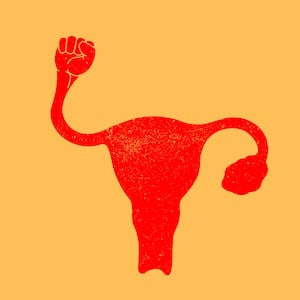Marking the first anniversary of the Supreme Court overturning Roe v. Wade, first-year Gov. Katie Hobbs (D-AZ) issued a far-reaching executive order that strips the state’s fifteen local county attorneys of their authority to prosecute abortion related cases. Turns out elections have consequences.
The bombshell order doesn’t stop there. It directs all cases prosecutable under Arizona’s 15-week ban—which doesn’t allow exceptions for rape or incest—to be exclusively handled by the state’s attorney general, Kris Mayes, who like the governor is a pro-choice Democrat and has only been in office since January.
And there’s more. Mayes has made it clear she won’t be prosecuting women and their health providers for alleged violations of an 1864 abortion ban, or poorly written post-Roe bans.
“It’s still early days, and we don’t have any active cases right now, nothing being prosecuted,” Mayes told The Daily Beast in a phone interview. “But it’s still a very important executive order that provides certitude to Arizona women and medical providers that we are going to protect and defend the fundamental rights of Arizonans, and we’re not going to criminalize abortion in Arizona.”
The executive order has Republican state legislators fuming about the governor’s overreach of power, and vowing to retaliate by halting confirmation of her appointees. Republicans have already been slow-walking the process, and Arizona law allows political appointees to serve for up to a year without Senate confirmation, so while the stalemate is not an empty threat, it’s a threat that won’t come due for a while.
“The governor and I didn’t take this step lightly,” says Mayes, who is confident the governor’s action will survive legal challenges. “This is an extraordinary situation. The U.S. Supreme Court overturned a right we had for 50 years. Arizonans elected a Democratic governor and AG who are pro-choice, and elections have consequences. Some Republicans are unhappy about it, but this is a consequence of Dobbs (the SCOTUS decision).”
If this was a Republican governor taking authority away from local Democratic officials, “I think the ideological lines would be very different, so there is a legitimate question about state government overreach and lack of deference to local officials,” says Jack Pitney, Professor of Politics at Claremont McKenna college.
Abortion changes the equation. Whatever qualms voters might have are outweighed by their anger over the loss of Roe. “Before Dobbs, the pro-life side could frame the issue to their advantage. Since Dobbs, the framing has shifted to whether abortion should be legal at all,” a position so alarming to most Americans that support for abortion in at least some circumstances soared to 85 percent in a Gallup poll, with 69 percent saying it should be legal in the first three months, a record high.
Until the repeal of Roe, the underlying procedure was presumed legitimate, and the debate was about regulations at the margin. Arizona has a strong libertarian streak, which also works to the governor’s advantage.
“I’ve made it pretty clear that our resources should not be used to prosecute doctors and women,” says Mayes, who immediately after the Hobbs decision issued a statement aligning herself with Gov. Hobbs—who tweeted a photo of herself signing the executive order. “We are on offense, and we will not let up,” Mayes said in her statement. “That means Arizonans can seek abortions and access reproductive health care—without interference or fear of criminal prosecution.”
She is battling cases related to an 1864 law which bans abortion and was put in place before Arizona was a state—and before women could even vote.
Mayes’ Republican predecessor as AG advocated for that law, and Mayes is honoring (if that’s the right word) a 15-week ban on abortion voted by the legislature and upheld by the Appeals Court “with no exceptions for rape and incest, which makes it unacceptable to most Arizonans,” she says.
Abortion is center stage in a state that is pivotal to next year’s presidential election, and to the Senate majority with Sen. Kyrsten Sinema potentially running for re-election as an independent.
“There are very active, relentless forces in Arizona intent on depriving women of their fundamental right to access abortion and they’re not going to let up,” Mayes said in the phone interview.
She is relying on the state’s Constitution, written during the Teddy Roosevelt progressive era, which has an explicit privacy clause, “Article 3, Section 8,” she says. “It hasn’t been tested,” she notes, then adding that the fate of abortion care will be decided in the form of a ballot initiative as early as next year, “and Arizonans like most Americans will reject these draconian abortion bans.”
What’s happening in Arizona is the “unleashing of the unpredictability of the abortion debate across America,” says Jim Kessler with the centrist Democrat group, Third Way. “A constitutional right a year ago has been turned into a crime and you can see how that crime could be a capital crime,” he says. “Abortion is murder was the message of the pro-life movement for decades. What Katie Hobbs is doing is responding to an extremist set of laws and trying to defend women.”
One out of four pregnancies end in abortion, which means that pre-Dobbs, there were 800,000 to a million abortions a year in the United States, says Kessler. “And we’re treating these women like they’ve committed a crime when a year earlier it was a right. The Dobbs decision in an instant turned law-abiding people into criminals. Eventually, someone is going to be arrested and prosecuted for having an abortion,” he says.
It won’t be in Arizona, and if that’s the marker that Katie Hobbs and her AG put down, that puts them in the history books right where they want to be as grassroots leaders in the ongoing fight for women’s freedom.









